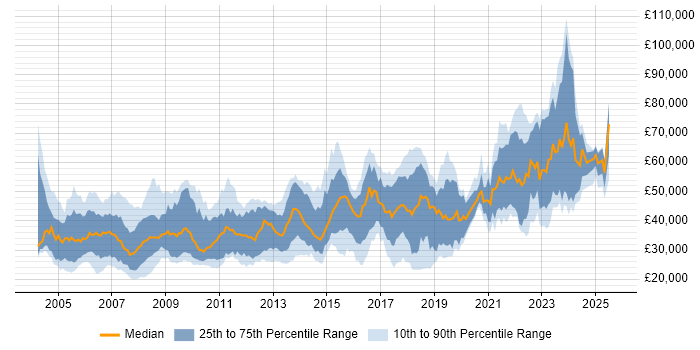Relational Database
South West > Bristol
The table below provides summary statistics and salary benchmarking for jobs advertised in Bristol requiring Relational Database skills. It covers permanent job vacancies from the 6 months leading up to 27 February 2026, with comparisons to the same periods in the previous two years.
| 6 months to 27 Feb 2026 |
Same period 2025 | Same period 2024 | |
|---|---|---|---|
| Rank | 92 | 83 | 102 |
| Rank change year-on-year | -9 | +19 | -9 |
| Permanent jobs citing Relational Database | 3 | 18 | 49 |
| As % of all permanent jobs in Bristol | 0.12% | 1.52% | 2.01% |
| As % of the Database & Business Intelligence category | 2.10% | 7.53% | 10.72% |
| Number of salaries quoted | 2 | 10 | 35 |
| 10th Percentile | - | £42,211 | £33,500 |
| 25th Percentile | £72,500 | £64,944 | £51,000 |
| Median annual salary (50th Percentile) | £75,000 | £68,525 | £70,576 |
| Median % change year-on-year | +9.45% | -2.91% | +31.30% |
| 75th Percentile | £77,500 | £77,813 | £112,500 |
| 90th Percentile | - | £81,000 | £148,564 |
| South West median annual salary | £43,953 | £50,000 | £52,500 |
| % change year-on-year | -12.09% | -4.76% | -3.67% |
All Database & Business Intelligence Skills
Bristol
Relational Database falls under the Databases and Business Intelligence category. For comparison with the information above, the following table provides summary statistics for all permanent job vacancies requiring database or business intelligence skills in Bristol.
| Permanent vacancies with a requirement for database or business intelligence skills | 143 | 239 | 457 |
| As % of all permanent jobs advertised in Bristol | 5.85% | 20.12% | 18.77% |
| Number of salaries quoted | 97 | 143 | 369 |
| 10th Percentile | £35,000 | £33,000 | £36,250 |
| 25th Percentile | £42,500 | £45,000 | £42,750 |
| Median annual salary (50th Percentile) | £60,000 | £60,000 | £62,500 |
| Median % change year-on-year | - | -4.00% | +17.37% |
| 75th Percentile | £73,750 | £73,886 | £77,500 |
| 90th Percentile | £86,250 | £84,750 | £94,013 |
| South West median annual salary | £52,500 | £57,500 | £52,500 |
| % change year-on-year | -8.70% | +9.52% | +5.00% |
Relational Database
Job Vacancy Trend in Bristol
Historical trend showing the proportion of permanent IT job postings citing Relational Database relative to all permanent IT jobs advertised in Bristol.

Relational Database
Salary Trend in Bristol
Salary distribution trend for jobs in Bristol citing Relational Database.

Relational Database
Co-Occurring Skills & Capabilities in Bristol by Category
The following tables expand on the one above by listing co-occurrences grouped by category. They cover the same employment type, locality and period, with up to 20 co-occurrences shown in each category:
